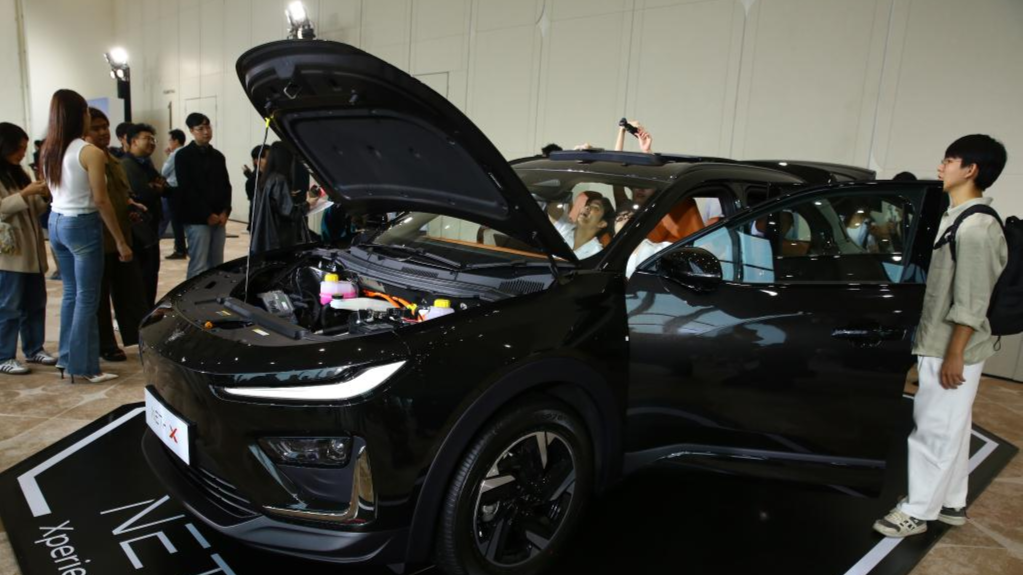
Electric vehicle (EV) maker Neta Auto launched its Hong Kong research and development center on Friday with a focus on intelligent driving, delivering a vote of confidence to the city’s push to become a global innovation and technology hub.
Under Secretary for Innovation, Technology and Industry Lillian Cheong Man-lei said the expansion bears testimony to Hong Kong’s push to promote its new energy vehicle sector and aligns well with the city’s strong basic scientific research and talent pool.
“At the same time, Hong Kong’s unique strength lies in its ability to promote deeper engagement in the global smart car industry, establishing an intelligent car testing and evaluation system that is in line with international standards and databases,” Cheong said.
READ MORE: NEV makers move fast in China leveraging innovation, cooperation
In 2022, the government unveiled the Innovation and Technology Blueprint, listing the new energy vehicle sector as one of the “strategic industries” in its efforts to build the city into an international innovation and technology center.
Its overall goal dovetails with the country’s drive for high-quality development, which aims at making the economy more innovative, efficient, and sustainable via high-tech manufacturing.
Fang Fang, partner of Waterwood Investment Group, said the arrival of Neta Auto could bring a “new industrial force” to Hong Kong given the automotive sector’s spillovers to other businesses.
The veteran investor cited the example of setting up a complete vehicle assembly plant, which involves a multitude of supporting institutions. “This not only supports Hong Kong’s GDP and industry but also helps attract more talent, increase the demand for financing, and boosts international trade and logistics needs,” Fang Fang said.
For Hong Kong, having more innovation-driven firms’ presence in the city is a key part of efforts to boost its technological strength as the Asian hub looks for new growth engines to drive the economy following the social unrest in 2019 and years of the COVID-19 pandemic.
According to the Innovation, Technology and Industry Bureau, over 100 technology companies have set up or expanded their businesses in the city in the past two years as of July.
A case in point is that CATL — the world’s largest EV battery maker — picked Hong Kong as its international headquarters and opened a research and development center in the city. Its investment is expected to exceed HK$1.2 billion ($154 million).
“After 24 years of development, China’s new energy vehicles have reached a relatively leading position in the global technology supply chain market,” said Fang Yunzhou, founder and chairman of Hozon New Energy Automobile. Neta is Hozon’s affiliated car brand.
“We believe that Hong Kong is not only a bridge connecting Eastern and Western cultures but also a strategic pivot for technology-based enterprises, including all of us present here, to build a global innovation platform,” Fang Yunzhou said.
READ MORE: Chinese mainland EV makers expand in HK as springboard for global growth
As outlined in the EV roadmap issued by the Hong Kong Special Administrative Region government in 2021, new registrations of fuel-propelled private cars, including hybrid vehicles, will be halted by 2035 or earlier.
There is still plenty of room for growth in the local new energy vehicle market, as evidenced by electric vehicles making up just 10.5 percent of the total number of vehicles in the SAR as of June this year, statistics from the Environmental Protection Department showed.
However, insufficient EV chargers in the city still remains a concern. By June 2023, there were around 96,000 electric vehicles in the city, with only 8,728 chargers for public use. They include 5,234 medium-speed chargers and 1,511 fast chargers, according to the Environmental Protection Department.
Contact the writer at evanliu@chinadailyhk.com


